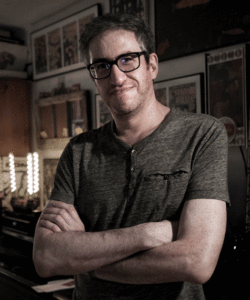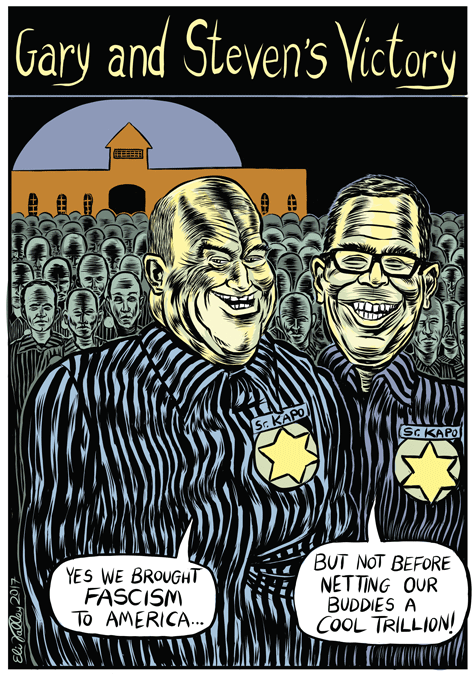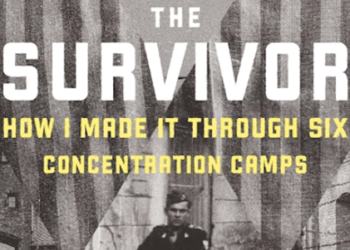By MORDECAI SPECKTOR
During a September 2017 appearance on Ari Melber’s MSNBC show, cartoonist Eli Valley said, regarding the aim of his politically-pointed artwork: “I want to contribute to making anyone who’s involved, even in a peripheral way, with [the Trump] administration: plutonium — unable to go to restaurants, unable to go outside without being shunned publicly, because they are an entire disgrace.”

When Melber asked if Valley was talking about a kind of “social shaming,” Valley added, “Within the Jewish world, these people should be excommunicated, I think. People who support this hero of American Nazism should be excommunicated.”
Valley, who recently published a collection of his cartoons, Diaspora Boy: Comics on Crisis in America and Israel (OR Books), will appear Jan. 24 at Blackstack Brewery in St. Paul, as part of the ninth annual Twin Cities Jewish Humor Festival.
The cartoonist talked on the phone with the Jewish World last week about his new book, critical reactions to his artwork, the Trump administration and his upcoming appearance here.
At the outset, Valley gainsaid my observation that his upcoming date in St. Paul was sort of extraordinary, in that the organized the Jewish community — in this case, the St. Paul JCC and the Sabes JCC — booked somebody who expresses a radical political critique.
“I’m very glad that there’s going to be an opportunity for more mainstream community members to listen,” he responded. “I don’t consider myself that radical, but I guess the perception might be there.”
Many of Valley’s cartoons portray high-profile leaders of the Jewish community in an unflattering way; but he said, “I think the cartoons in the book reflect the mainstream Jewish community opinion, which is a foundationally progressive mentality; and, in terms of Israel, anti-authoritarianism doesn’t strike me as radical.”
The “radical” is Netanyahu, according to the 47-year-old comic artist.
“To me, it’s an affront to decency when he’s invited to any American Jewish institution,” Valley commented, regarding the Israeli premier. “I find that offensive.”
For Valley, the American Jewish community’s response to what’s happening in Israel is not commensurate with the crisis there, which is a “microcosm” of what’s happening now with the Trump agenda.
In Israel, Valley said, there’s been “the assault on civil liberties, on marginalized communities, on the institutions of democracy including the press. Netanyahu has gone there already, for a decade at least, in Israel, and now we’re going there in America. I think one of the reasons segments of the American Jewish community have been tacitly or openly approving of Donald Trump is the experience of openly approving of Netanyahu’s radicalism.”
Valley also mentioned that Netanyahu spoke before rabid, right-wing crowds that vilified then Prime Minister Yitzhak Rabin, just prior to a Jewish Israeli extremist assassinating the premier, in 1995. “The man is off the deep end of the Jewish political spectrum…. Maybe his alliance with Trump materializes a lot of the toxicity, but the toxicity has been there.”
Again, Valley has been booked at the Twin Cities Jewish Humor Festival.
On Jan. 24, he will present a slideshow and “a personal, political, polemical presentation. It goes into my own roots, my own satirical beginnings, my sources of inspiration,” and then brings the conversation “back to this crisis that we’re experiencing today, both as Jewish Americans and as Americans, with the explosion of white supremacism, and the alliance among certain Jewish communal leaders with neo-Nazis.”
The previously mentioned cartoon collection, Diaspora Boy — with an introduction by Peter Beinart — has met with critical acclaim. Publicity for the book also included blurbs by Valley’s detractors.
“Your work is disgusting. And also stupid,” commented neo-con pundit Marty Peretz. Former ADL director Abe Foxman pronounced the cartoons as “bigoted, unfunny.” And Bret Stephens, now a New York Times columnist, said the work was “grotesque… wretched.”
“They’re not people I respect,” remarked Valley, about his critics. “Abe Foxman is an Armenian genocide denier…. He’s openly bigoted against Arab Americans…. I welcome his hatred, because it’s the only side you want to be on with these kind of people.”

In attacking his political antagonists, Valley sometimes employs Holocaust imagery. He justifies this artistic choice in view of the “emergency situation” that has ensued since Nov. 8, 2016. Drawing on these emotionally fraught images from our “collective memory and collective tragedy can be poignant and effective,” he explained. “We have to use every means at our disposal.”
During an April 2017 talk at the National Museum of American Jewish History, in Philadelphia, Valley discussed his use of Shoah imagery, in the cause of resisting the Trump policies: “How do you satirize a living nightmare? A related question is this: What about using our history and memory for non-Jewish contexts? Does that trivialize our unique experience? … In my view, no, it actually sanctifies it, because if our collective memory is used only as blinders when similar horrors start happening to other people, then our history is worthless.”
At this talk, Valley showed his cartoon depicting Trump son-in-law Jared Kushner in a Nazi uniform (with former White House strategist Stephen Bannon). He said, “I was furious, and I am furious, that a Jew is giving comfort to and is colluding with white supremacists and Nazi allies. We should not stop being shocked by this.”
Valley, who was raised in southern New Jersey, near Philadelphia, said his parents divorced when he was young. His father is a Conservative rabbi, who served in pulpits in the New York City and New Jersey area. His mother was “fairly secular. So I had that kind of push and pull, and tension in my childhood.”
Among his comic inspirations, Valley mentioned the Mad magazine comics for their “satiric energy.” He also noted that the “pulp comics” from the 1960s, in the horror, genre, “with their melodrama” and “extreme energy” were “a great model as a tool for satire.” When I mentioned R. Crumb’s comics, Valley replied, “Totally, R. Crumb, absolutely.”
Eli Valley’s upcoming appearance should be a highlight of the 2018 Jewish cultural season in the Twin Cities. His work combines “comedic aspects and also… very serious aspects,” he allowed.
Comedy and tragedy.
“Basically, yeah.”
***
Eli Valley will present cartoons from Diaspora Boy 7:30 p.m. Wednesday, Jan. 24 at Blackstack Brewery, 755 Prior Ave. N., St. Paul. For information, go to: sabesjcc; for tickets, call Brown Paper Tickets at 1-800-838-3006. His appearance is part of the Twin Cities Jewish Humor Festival (see Page 9), which is sponsored by the Sabes JCC and the St. Paul JCC.
(American Jewish World, Jan. 12, 2018)






















Heard you on NPR this morning (5/4).
Keep your bellows to the embers.
Thanks,
-NRK
.